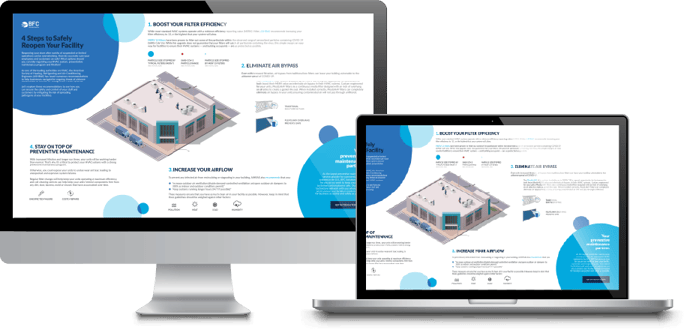
Minimum Efficiency Reporting Value—more commonly referred to as MERV—is the governing scale designed by the American Society of Heating, Refrigerating and Air Conditioning Engineers (ASHRAE) to gauge the particulate efficiency of an air filter. MERV only addresses the ability to capture particles when the filter is initially installed and does not evaluate the efficiency as the filter loads in the unit.
Increasing the MERV value is not always the best solution for the facility’s HVAC unit. As the efficiency of the filter media installed in the HVAC unit increases, the airflow can actually become more restricted and worsen the air quality in the space. This is the result of the filter media itself having a higher initial resistance. The higher amount of particulate captured by the filter creates a quick dust build-up (dust cake), which results in reduced airflow in the unit. Most commercial HVAC systems can accommodate a MERV filtration value of up to 13. Any efficiency above MERV 13 is not recommended in a commercial RTU (rooftop unit) or air handler. The typical commercial HVAC system in a restaurant or retail facility is not initially designed to accommodate higher efficiency filters—such as MERV 15, 16 and HEPA filters—and may potentially cause equipment failure or damage.
Running the unit’s fans continuously and opening fresh air dampers will introduce more outside air into the space. This in turn creates positive air pressure in the space and pushes out any stagnant air through open windows and doors. The result is better indoor air quality. It’s also important to note that the filter is a product designed to be the first line of defense in protecting the heart of the HVAC unit—the evaporator coil. Maintaining a clean evaporator coil keeps the overall HVAC system healthier and operating at peak performance. For most HVAC systems, the filter is designed to protect the equipment, not to specifically improve indoor air quality.
High Efficiency Particulate Air Filters (HEPA filters) are not a fail-safe solution when it comes to COVID-19. These filters are designed to trap 99.97% of particles that are 0.3 microns. This means that not all viruses can be contained with HEPA filtration. COVID-19 particles are spherical particles with a diameter of 0.125 microns. The smallest particles are 0.06 microns and the largest are 0.14 microns. HEPA filters are mainly used in operating rooms, laboratories, clean rooms, etc. They are less effective in spaces where there is continuous activity (i.e. doors opening/closing or people moving in/out).
We have a committed team overseeing our response and we continue to carefully monitor conditions as the situation evolves. We are adhering to recommendations and guidelines from the CDC and WHO, in addition to local/federal regulations. For additional information with respect to the HVAC industry, visit ASHRAE’s COVID-19 resource bank.
However, ASHRAE's recommendations don't stop there! You can find all of our tips for a safer reopening in our new infographic: 4 Steps to Safely Reopen Your Facility.

Address
BFC Solutions
One Vantage Way, Suite D-210
Nashville, TN 37228